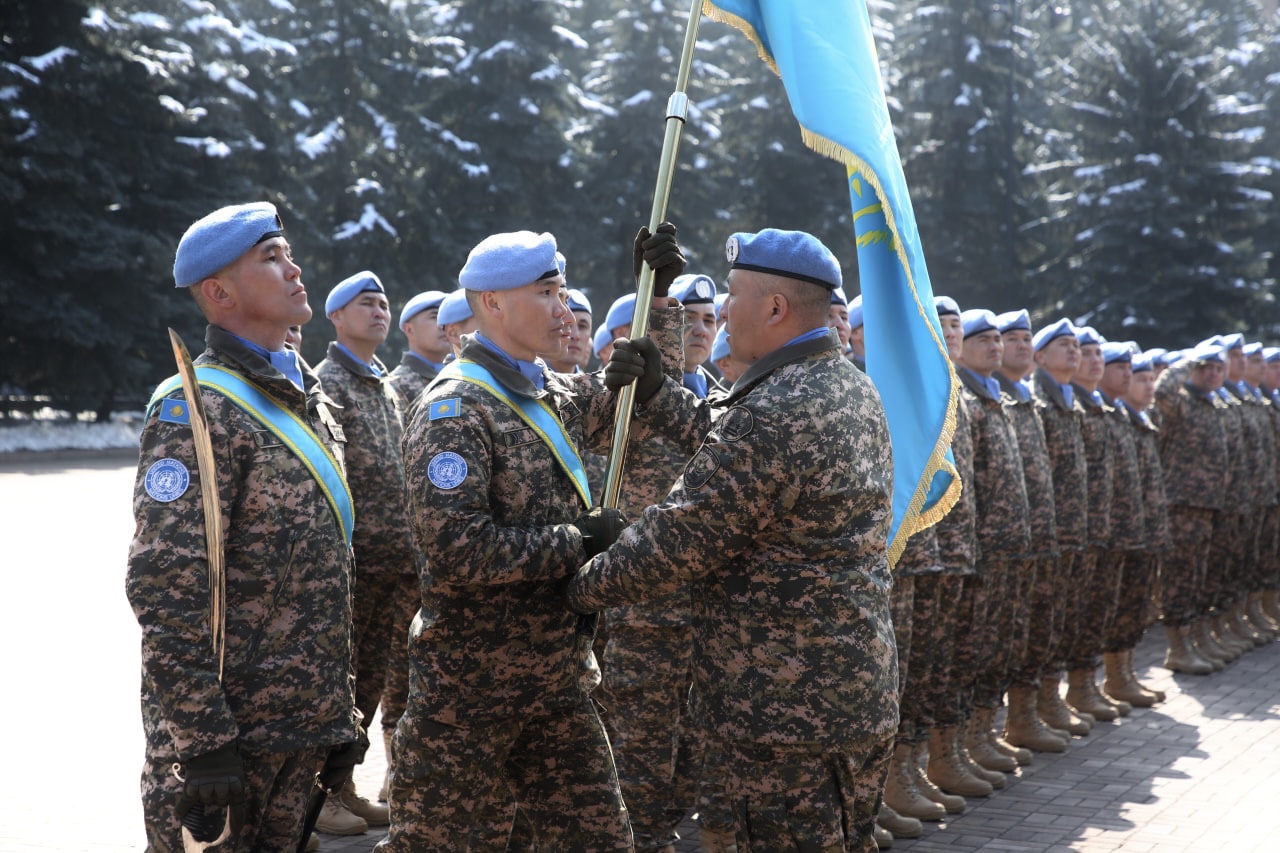This past week, the media paid attention to Kazakhstan’s deployment of 140 peacekeepers in the Golan Heights to monitor the disarmament process and to manage a buffer zone between Syria and Israel, a Kazakhstani government business delegation’s meeting in Germany to discuss investment opportunities in Kazakhstan including the announcement of twenty-two new development projects, a meeting between Uzbekistani and Taliban representatives in Kabul to open up the country to investment from Uzbekistan and create favorable trade relations, and the meeting between working groups from Tajikistan and Kyrgyzstan to further resolve the border dispute between the two countries across a 10.76-kilometer stretch of land.

Kazakhstani peacekeepers assembled in Astana prior to deployment. Source: Astana Times
Deploying from Alamty on March 14, a contingent of 140 members of Kazakhstani soldiers arrived in the Golan Heights, a disputed stretch of territory between Syria and Israel, to monitor and support the United Nations peacekeeping mission in the region. This dispatch of peacekeepers represents a historic moment for Kazakhstan, since it is the first time Kazakhstani soldiers have been deployed independently to support peacekeeping operations, using their own weapons and equipment (Astana Times). The Kazakhstani soldiers will be taking over operations previously led by a contingent of Irish peacekeepers and will be responsible for the management of garage facilities at Fauer base in the territory, as well as conducting patrols and ensuring that the demilitarization of a buffer zone is respected (Kaz Inform). Kazakhstan’s Defense Minister Ruslan Zhaksylykov stated that the deployment was “a great honor” for the country and demonstrates Kazakhstan’s modern military capabilities (Astana Times).
Arriving in Berlin, a delegation of Kazakhstani business leaders met with members of the Eastern Committee of the German Economy to discuss investment opportunities in Kazakhstan. Joined by the Vice Minister of Industry and Construction, the Kazakhstani cohort discussed a series of twenty-six projects ranging from engineering, construction and metallurgy with their German counterparts. Over the course of the meeting, Kazakhstan’s LLP "S-Agro-Borovskoe," signed a memorandum of understanding with Zollmann Stutenmilch GmbH, a dairy producer to coordinate business operations (Kazakhstan Today). The delegation participated in further meetings in Erfurt, Thuringia to sign further investment deals with East German companies in the fields of energy efficiency capabilities, education, infrastructure development and construction. A further memorandum of understanding was signed between Kazakhstan and the state of Thuringia to court future investment opportunities (Astana Times).
Representatives from Uzbekistan’s government arrived in Kabul, Afghanistan, to discuss the “activation” of Uzbekistan and Taliban-controlled Afghanistan’s economic relations. Over the course of the meeting, Uzbekistani officials expressed their desire to create “favorable trade relations” and bolster cooperation between the two countries. While this meeting was taking place, another meeting was held between the Taliban’s foreign minister and his Uzbekistani counterpart alongside the Qatari Foreign Minister in Doha to facilitate further economic cooperation between Afghanistan and Uzbekistan (Kun Uzbekistan). In Kabul, the discussion focused on opening investment opportunities in the coal mining sector, improving rail connectivity between the two countries, and promoting the equitable sharing of water resources on the Amu Darya River, a major environmental concern for Uzbekistan (Gazeta Uzbekistan).
As part of an ongoing series of meetings to demarcate the Tajik-Kyrgyz border, a delegation from both countries met in Buston, Tajikistan, along their shared border to further resolve the two states’ longstanding border dispute. The meeting was chaired on the Kyrgyz side by Kamchybek Tashiev and on the Tajik side by Saimumin Yatimov, both representatives from each state’s National Security ministries (Aki Press News). During the meeting, both sides agreed on a legal framework to delineate the border across a 10.76-kilometer stretch and to regulate the use and movement across the border (24.kg). The next planned meeting, which will take place in Kyrgyzstan, will be centered on the creation of border checkpoints and their management to further rectify the dispute (24.kg).
The military and border dispute between Pakistan and Afghanistan escalated this weekend again as Pakistani military jets bombed towns in Paktika and Khost province along both countries’ shared border this weekend, killing eight civilians. Pakistan’s government claims that the provinces harbored militants in the Taliban’s Pakistani offshoot, Tehreek-e-Taliban Pakistan (Tolo News). The government in Islamabad further claims that the escalating strikes were a result of the Taliban’s inability or unwillingness to combat terrorist organizations on their own soil. In retaliation, Taliban forces launched artillery strikes across the border, killing three Pakistani soldiers (Ariana News). Taliban officials further claimed that the attack was a violation of Afghanistan’s sovereignty and would be met with escalating force from their forces in retaliation, stating that “such incidents can have very bad consequences which will be out [of] Pakistan’s control” (Bakhtar News).

